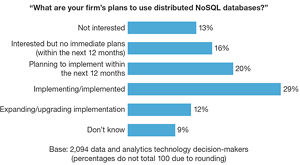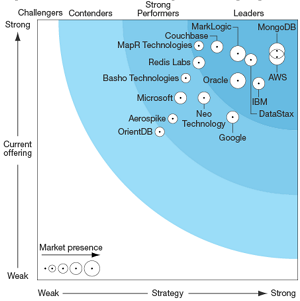News
Amazon DynamoDB Ranks High in Big Data NoSQL Research Report
The Amazon DynamoDB database from Amazon Web Services Inc. (AWS) is among the "Leaders" of Big Data NoSQL offerings analyzed in a new report from Forrester Research Inc.
The research firm surveyed 15 vendors in its Q3 2016 Forrester Wave report. Amazon DynamoDB and eight others were deemed Leaders, five were pegged as Strong Performers and one was named a Contender in the NoSQL space, which Forrester said is a crucial technology area for data-intensive organizations.
"NoSQL is not an option -- it has become a necessity to support next-generation applications," the report states. "And increasingly, enterprises of all types and sizes are embracing NoSQL to support their business technology (BT) agenda. A key strength for NoSQL is the ability to support scale-out architecture leveraging low-cost compute servers that are clustered to deliver performance of large, high-end SMP servers. In addition, its flexible schemaless model offers the ability to store, process and access any type of customer and business data."
In listing the benefits of NoSQL, Forrester said it:
- Enables elastic scale to support dynamic workloads.
- Supports flexible data models to support any type of data.
- Delivers extreme read and write capabilities for demanding customer apps.
- Simplifies data management for any type of application.
- Lowers data management cost.
The firm borrowed from other research to highlight the importance of the technology to enterprises, illustrated in this graphic:
 [Click on image for larger view.]
Enterprise Architects Are Seeing the Opportunity in NoSQL (source: Forrester Global Business Technographics Data and Analytics Survey, 2016)
[Click on image for larger view.]
Enterprise Architects Are Seeing the Opportunity in NoSQL (source: Forrester Global Business Technographics Data and Analytics Survey, 2016)
For its new NoSQL report, Forrester examined the following 15 vendors: Aerospike, AWS, Basho Technologies, Couchbase, DataStax, Google, IBM, MarkLogic, MapR Technologies, MongoDB, Microsoft, Neo Technology, Oracle, OrientDB and Redis Labs.
Among those, Amazon DynamoDB was a standout, neck and neck with MongoDB in the Strategy axis of the Wave graphic and trailing only a few other databases in the Current Offering axis, although Forrester didn't provide a strict numerical ranking of the offerings.
"Amazon DynamoDB is the most popular NoSQL cloud database," Forrester said in its product evaluation. "Amazon DynamoDB is a fully managed NoSQL cloud database platform that uses a solid-state drive (SSD) to store, process and access data to support high performance and scale-driven applications. It automatically shards the data across servers based on the workload's throughput and storage requirements and offers a seamless experience to handle larger high-performance use cases. Customers can easily scale, monitor and manage their tables both via APIs and the AWS management Console.
"Also, DynamoDB is tightly integrated with Amazon EMR, offering the ability to run queries that span multiple data sources. DynamoDB natively supports both key-value and document models and also has a library for geospatial indexing. Graph is now supported via the TitanDB plug-in. Enterprises use DynamoDB to support a variety of use cases, including advertising campaigns, social media applications, tracking gaming information, collecting and analyzing sensor and log data, and e-commerce."
 [Click on image for larger view.]
Forrester Wave Big Data NoSQL Q3 2016 (source: Forrester Research)
[Click on image for larger view.]
Forrester Wave Big Data NoSQL Q3 2016 (source: Forrester Research)
Here are Forrester's one-line summations of the other eight offerings in the Leaders category (measuring a combination of each vendor's current offering, its strategy and its market presence):
- MongoDB is shortlisted by [enterprise architecture] pros for its document capabilities, security, tooling and services.
- DataStax has strong capabilities for applications that demand data distribution across datacenters and the cloud leveraging the Apache Cassandra platform.
- MarkLogic's mature multimodel database has some of the largest NoSQL deployments across industries.
- IBM Cloudant is a cloud-based database service offering zero-configuration automation.
- Couchbase offers ease of use for document-oriented databases.
- Oracle offers distributed key-value database capabilities with integration with Oracle relational databases.
- MapR Technologies' multimodel database platform includes Hadoop, Spark and event streaming.
- Redis Labs provides an enterprise-class version of the open source Redis database in the form of a managed cloud service (Redis Cloud) as well as on-premises software (Redis Labs Enterprise cluster).
The Strong Performers category included Google Cloud Datastore, Basho Riak, Neo Technology's Neo4j, Microsoft DocumentDB and Aerospike. The last offering, OrientDB, was deemed a Contender.
Forrester uses a combination of vendor surveys, product briefings and demos and customer reference calls in formulating its Wave reports, which it said should be only a starting point in more comprehensive evaluations of the various products.
About the Author
David Ramel is an editor and writer at Converge 360.